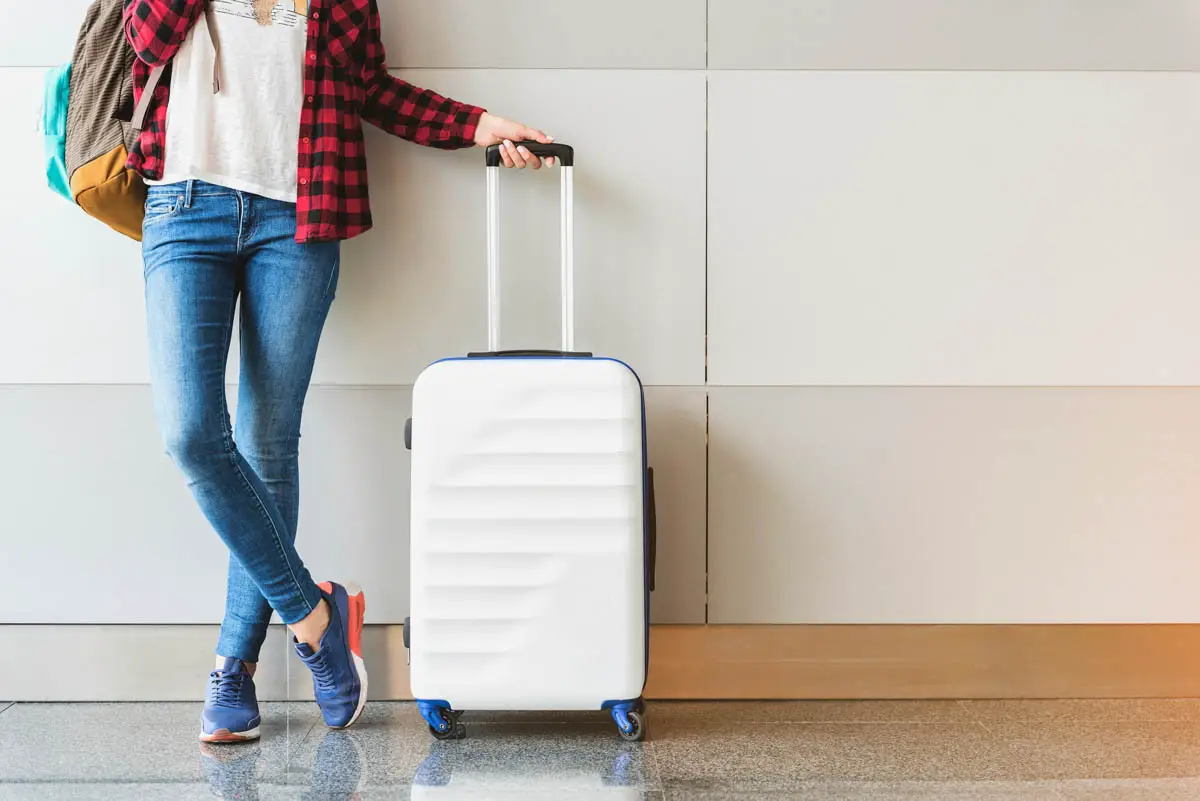If you are a student (or a parent of one) planning to study abroad, you’ve come to the right place! In this comprehensive guide for how to prepare for studying abroad, we’ll discuss everything from selecting the best destination for your educational goals to creating a communication plan to keep in touch with loved ones back home.
Disclosure: This guide for how to prepare for studying abroad contains affiliate links. When you click on and make a purchase from one of these links, I may earn a commission.
15 Tips for Students Planning to Study Abroad
Studying abroad is an impactful — and sometimes even life-changing — experience. It’s a wonderful opportunity to immerse yourself in a different culture than your own and to practice foreign language skills while earning academic credits toward your degree.
I say this from my own personal experience. During my college years at Central Michigan University, I spent a semester studying German language and living with a local family in Bielefeld, Germany.
Not only was my semester abroad the highlight of my college experience with many fond memories of the friendships I formed and trips I took around Europe, but it also shaped my worldview and inspired my career as a travel writer.

Though studying abroad is immensely rewarding, it isn’t always easy. There may be cultural or language barriers to overcome. You may become homesick, missing your loved ones, your favorite comfort foods, or simply the familiarity of home. And, you may even struggle with the academic coursework as you adjust to being in a new country.
Fortunately, with academic tools, such as a writing assignment service, and the following 15 tips, you will be prepared to conquer the challenges and enjoy the unique experiences of studying abroad.
First, Choose Your Destination!
Before you apply to study abroad, you should research your options. As you decide where to study abroad, you might consider:
- What are the academic and language requirements to study in that country?
- Are you interested in learning a foreign language? Are you fluent in another language?
- Is there a program in this country that fits your major, minor, or intended field of study?
- How long do you want to study abroad? Short term? Summer? Semester? Academic year? A full degree program?
- Can you transfer credits back to your university at home?
- Is there financial aid, such as scholarships or grants, available?
- What is the cost of living in this country?

Consider Studying Abroad During Tourist Off-Season
As you consider studying abroad, you may also want to consider the timing of your study abroad program.
By studying abroad during a destination’s slow tourism season, you will likely have a more authentic local experience.
Additionally, you’ll find lower prices on flights and hotels this time of year. This could help you stick to your student budget or to afford trips on your weekends and school breaks.
Here are the typical off-season tourism months at popular study abroad destinations:
- Australia and New Zealand: June – August
- Japan: August – December
- South Korea: December – March
- USA and Canada: November – April
- Western Europe (UK, Ireland, France, Spain, etc.): October – January
Gather Documents
Preparation for studying at a university in another country can take anywhere from months to a year.
As you prepare, gather the necessary documents, such as your passport, visa, and academic transcript. Additionally, you may need to translate documents or take qualifying exams.
If you already have a passport, check that it doesn’t expire within six months of your return from abroad. If not, you will likely need to renew your passport to study abroad.
In addition to your passport, you may also need to apply for a visa. This depends on where you’ll be studying abroad and how long you’ll be there.
RELATED: Five International Travel Documents You May Need to See (and Taste) the World
Apply Early for Scholarships and Grants
If your ability to study abroad is contingent upon getting financial aid to cover or offset the tuition fees, room and board, and travel costs, then you should apply early in the process for scholarships and grants.
I recommend applying for scholarships before applying to foreign institutions or study-abroad programs. For example, I applied for a scholarship through my university during the spring semester of my freshman year to study abroad the following spring semester in my sophomore year. Likewise, my husband, who came to the United States from Iraq to earn his master’s degree, applied for his national scholarship about a year in advance.
Decide Where You’ll Live
There are various housing options for students studying abroad, but they differ depending on the program.
Some study-abroad programs include an immersive homestay, where you’ll live with a local family. This is an excellent way to practice your language skills, experience cultural customs firsthand, and eat home-cooked meals in the local cuisine.
Other programs may offer dormitories or apartments for international students, offering opportunities to live with other students from different cultures around the world.
If you are arranging your study-abroad experience through your home university, you should discuss housing options with your study-abroad advisor.
For those applying to a graduate program at a foreign university, you may need to find housing on your own. Some universities offer graduate student housing and international student housing for which you may qualify. Otherwise, plan to arrive ahead of the start of the academic year to search for an apartment or room to rent near campus.
Purchase Travel Insurance
Foreign universities may require international students to purchase a health insurance plan specifically for international students, but you should also consider purchasing travel insurance.
In addition to covering emergency medical care and transportation costs, travel insurance plans may also cover trip cancellations and interruptions, lost or damaged baggage, delayed baggage, or travel delays.

Book Your Flight
Once you have been accepted into a foreign university or study abroad program, use online flight aggregator tools, such as Skyscanner and Google Flights, to search for affordable airfare. You can also set up Google Flights alerts to track price fluctuations.
RELATED: How to Save for a Europe Trip: 13 Money-Saving Tips for Your Dream European Vacation
Arrange Your Airport Transfer
Once you have your flight details in place, you’ll want to arrange transportation from the airport to your university or accommodations. This may be arranged through your study abroad program. If it’s not, you’ll need to research ground transportation options.
The airport website is a great place to start your research. Typically, you can find information on accessing public transit and taxis, as well as taxi fares.
Another option is to book a private airport transfer. I recently used Welcome Pickups, which operates in 152 global destinations, to get from the airport to my hotel in Istanbul.
I recommend Welcome Pickups because it’s a convenient and safe service. With a flat rate, there are no surprise fees or metered fares, and you can conveniently modify your reservation via the mobile app. Additionally, all the drivers speak English, and they will send you pickup instructions via WhatsApp.
Visit Your Doctor
To study abroad, you may be required to have a physical or have certain immunizations. While you are at your doctor’s appointment, you may also want to ask your doctor for a prescription for any medications you regularly take.
Additionally, you should see which immunizations the Centers for Disease Control and Prevention recommends for the areas where you’ll be studying and traveling. For example, if you plan to study in Paris, the CDC recommends keeping your routine vaccinations up to date. It also recommends getting vaccinated against Hepatitis B and, if you plan to eat street food, Hepatitis A.
RELATED: Six Tips for Staying Healthy While Traveling
Learn About Your Destination’s Culture & Language
Before you study abroad, you should learn about the culture and customs of the destination where you’ll be living. A great place to begin your research is the Culture Smart! guidebook for the country where you’ll be studying.
Also, you should be prepared to communicate in the local language. This doesn’t mean that you need to be fluent in a second language, but it’s helpful and polite to at least know basic phrases.
Even if you are a native English speaker heading to another English-speaking country, you may find regional differences in spellings, word choices, slang terms, or meanings of words.
If you are studying in a country where a language other than your own is spoken, consider downloading language tools to your phone. Apps like Duolingo allow you to practice your language skills, while Google Translate helps translate words while you are on the go.
Take Precautions for Your Safety
Among the steps American students should take before studying abroad is registering with the U.S. Department of State’s Smart Traveler Enrollment Program (STEP).
Students enrolled in STEP will receive notifications from the nearest U.S. Embassy about safety conditions in the country.
Additionally, being registered in STEP helps the U.S. Embassy or Consulate contact you in case of emergencies.

Pack Light
Packing to study abroad may seem daunting, but you can pack everything you need in one suitcase and a backpack, which will double as your bookbag and travel daypack.
I recommend utilizing compression storage bags, packing cubes, and shoe bags to organize your luggage.
Clothing
Keep in mind that, unlike on short trips, you’ll have to do laundry during your time abroad. Therefore, you only need to pack a travel capsule wardrobe, with pieces that can be mixed and matched to create different outfits.
It’s also important to bring clothing you can layer since you’ll likely encounter changes in the weather while studying abroad.
RELATED: How to Pack the Best Women’s Shoes to Wear in Europe [Summer Edition]
Toiletries
As for toiletries, I recommend packing only enough travel-sized toiletries to get you through your first few days. Once you have settled in, you can purchase shampoo and other personal care items there.
However, the exception is if there are specific items or brands you need or prefer that you won’t easily find abroad. For example, tampons with applicators can be challenging to find in some countries, so you might want to pack enough for the whole time you’ll be abroad.
Electronics
Due to voltage differences, I don’t recommend bringing a hair dryer, curling iron, or flat iron. Instead, plan to purchase an inexpensive one there.
Although you should leave your hair appliances at home, it’s still a good idea to bring a plug adapter and voltage converter to charge your phone, camera, and laptop.
School Supplies
Don’t forget to bring a couple of pens in your carry-on, but you should wait to purchase other school supplies when you arrive.
Bed & Bath Linens
Lastly, if a homestay is part of your study abroad experience, you won’t need to worry about providing bed linens and bath towels. On the other hand, if you’re moving into a dorm or apartment on your own, you’ll likely need to provide these items yourself.
Since these items are bulky, I recommend purchasing inexpensive bed and bath linens once you arrive or ordering them online in advance for delivery. At the end of your time abroad, you can gift them to another student or donate them to a local charity.
If you plan to travel and stay in hostels during your time abroad, I recommend bringing a fast-drying travel towel (and a cheap pair of flip-flops, too) for the showers.
Bring Gifts from Home
Especially if you’re being hosted by a local family, bring gifts from home to show your gratitude to the people you meet.
You might pack a couple of small tokens for friends you meet along the way, but most importantly, pack a “thank you” gift to present to your host family at the end of your stay.
These gifts should not be extravagant. Instead, select thoughtful gifts that are inexpensive, lightweight, and represent you or where you live.
Ideas of gifts to bring to host families:
- Soup mix or cookie mix for a traditional cookie from your home (i.e. chocolate chip cookies if you are American)
- Unique foods from your home country or region, such as peanut butter (if you are American), Vegemite (if you are Australian), or maple syrup (if you are from Canada or New England)
- Coffee or tea
- Candies
- Cookbook or recipe cards of regional specialities
- Travel photography book of your home city, state/province, or country
- Souvenirs such as keychains, mugs, playing cards, or a calendar from your hometown
- T-shirt, hat, or other small gifts from your home university
If you forget to prepare this ahead of time, you can pick up souvenirs in an airport gift shop as you depart your home country.
Plan to Capture Memories
Studying abroad will be full of memories you won’t want to forget! I recommend that you at least document your experience for yourself by keeping a journal, taking photos, and/or shooting videos.
If you want to share your experience with family and friends back home, you can also start a dedicated social media channel, blog, or vlog to share your cultural insights, travels, and your own tips for studying abroad.
To capture memories while studying abroad, make sure your phone has sufficient storage.
Also, if you’re bringing a camera, be sure to bring extra memory cards and all the necessary cords and chargers. I also recommend packing an extra battery, any desired lenses, a microphone if you are planning to vlog, and a lightweight travel tripod.
RELATED: How to Make a Travel Video: 10 Tips for Beginners to Create Compelling Travel Videos
Make a Plan to Keep in Touch with Friends & Family
Finally, it’s essential to create a communication plan to stay in touch with your parents and other loved ones back home.
There are many apps to help you keep in touch, including:
- WhatsApp — Free app from Meta for encrypted texting, voice calls, video chats, and audio messages.
- Zoom — Great for pre-arranged group video chats!
- Skype — Offers affordable international calling plans for voice and video calls. This is the best option for calling landlines in the US!
- iMessage and FaceTime — Available only on iPhones, iPads, and other Apple devices for texting, voice calls, and video chats.
- Facebook Messenger — Great option for video chats with up to 50 people! Plus, you can send text messages, but you must have a Facebook account.
Don’t forget to share this information with your family and friends! Once you select the app(s) that work best for your needs, set up group chats for texting family and friends, and/or schedule recurring video chats with your family.
Conclusion
Studying abroad can be an immensely rewarding educational experience. It’s an opportunity to gain independence, cultural insights, foreign language skills, and unique travel experiences — all while earning academic credits!
However, studying abroad takes preparation. From researching programs and destinations to find the right fit for you to packing your suitcase, you can use this guide as you plan your own study-abroad experience.
In this post, I shared 15 tips for preparing to study abroad. This advice was based on extensive research, as well as my own experience spending a semester in Germany and my husband’s more recent experience as an international graduate student in the United States.
With the proper preparation, you can have an amazing — and perhaps even life-altering — experience studying abroad. Your adventure awaits!
Planning to study abroad? Save this post to your study abroad tips board on Pinterest to easily refer back to later!

Photo credit for lead photo: © JD8/Adobe Stock

Leave a Reply